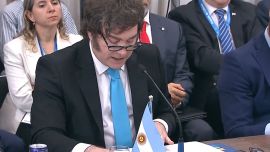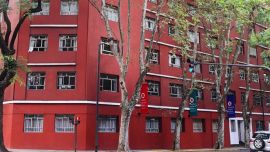If you can take your eyes off the presidential election saga in the United States for a minute, you will notice things happening in Argentina too. President Alberto Fernández is facing questions about the executive performance of his Cabinet and not only from the opposition. Vice-President Cristina Fernández de Kirchner's recent written statement month about the political situation in Argentina included a line about “functionaries that don't function.” On the surface it was a passing remark but it immediately prompted speculation about a reshuffle. Now, little more than two weeks on, a minister has been shown the door. Housing Minister María Eugenia Bielsa will be replaced by a militant Kirchnerite mayor from Greater Buenos Aires.
Bielsa, the sister of Leeds United manager Marcelo Bielsa, is from Santa Fe Province and is not a member of the Kirchnerite wing of the ruling Frente de Todos coalition. The new man in charge is Avellaneda Mayor Jorge Ferraresi. What you can read into this change, even if it is not followed by a major Cabinet reshuffle, is that the Kirchnerite wing is indeed dissatisfied with the work of some officials.
The Housing Ministry is new. It was established by Fernández upon the president taking office late last year. The decision to grant the Kirchnerite wing control of the portfolio comes after hundreds of families occupied a plot of land in Greater Buenos Aires. The squatters at the Guernica encampment were eventually forced out by the provincial police amid clashes. Similar occupations have taken place in more than 10 provinces nationwide.
After the Guernica incident, the opposition criticised Axel Kiciloff, the Kirchnerite governor of Buenos Aires Province, accusing him of initially tolerating the squatters and of delaying the eviction. The traumatic end to the occupation made the left-wing of the coalition lose face. Now that same wing will manage the Housing Ministry, presumably in a bid to fix the rampant housing problem in Greater Buenos Aires.
The move also increases Ferraresi's political standing and muscle ahead of next year's midterm elections. Greater Buenos Aires, a Kirchnerite bastion, is a sprawling urban belt that surrounds the capital. It usually votes Peronist. With Ferraresi as minister, the Kirchnerite camp could have a mighty office for electioneering in 2021, even if the left-wing of the coalition continues to be hit by its internal arguments in the region. (The public works minister is also a former mayor.)
The midterm elections look far away with the coronavirus epidemic still raging, but talk is already underway. There’s talk that the government could move to scrap the compulsory PASO primaries normally held ahead of the midterm elections. Meanwhile, hawkish wing of the centre-right opposition Juntos por el Cambio (JxC) coalition is keeping up the agitation. Another flag-waving anti-government protest was held on Sunday with former security minister Patricia Bullrich leading the charge. The former security minister, now the leader of centre-right ex-president Mauricio Macri’s PRO party, was forced to apologise after reports surfaced that she used free tickets, courtesy of the Senate, to fly to Córdoba Province to attend the demonstration.
The question now is whether the regional winds have shifted enough for these confrontational protests to lose their menacing clout. A new leftist government has taken office in Bolivia, with Evo Morales heading home; Chile has voted to scrap its dictatorship-era constitution and write a new one; Joe Biden is on his way to becoming the new president of the United States – where does that leave the notion that massive protests could force the Fernández administration out of office before the end of its four-year mandate?
Perhaps tensions elsewhere will lead the way. Defence Minister Agustin Rossi this week blasted a newly-established liaison board of retired military and police officers, saying it must be a group designed to attack the democratic system. Former caretaker president Eduardo Duhalde, once a kingmaker in the Peronist Party, raised eyebrows recently when he suggested that a military uprising was possible (he later apologised, putting down his comments to stress). Now the defence minister is accusing this new group of coup mongering. Rossi said the group was trying to “dispute the leadership of the Armed Forces.”
Right here and now the notion of a conspiracy sounds outlandish, but Argentina has a history of ugly political turmoil in December and the national government seems to be readying to deal with any trouble that might surface before the end of the year. Times are tough: the pandemic has smashed Argentina’s economy. Economy Minister Martin Guzmán is fighting to control the black market dollar. He was relatively successful for two weeks with financial policies but now the price of the dollar in the black market has rebounded. The minister's future depends on his bid not to devalue the peso in the official market.
Guzmán is now in negotiations with the International Monetary Fund (IMF) to reschedule payments for the US$44-billion credit-line granted during the Macri presidency (reportedly thanks to the auspices of Donald Trump). Argentina plans to buy time by seeking an Extended Fund Facility (FFF) from the IMF. That would give the country between four and a half years and 10 years to repay after the start of the agreement, Reuters reported. At issue now is the extent of the structural reforms that the IMF might demand from the country under the terms of an extended facility.
Guzmán has ruled out sweeping structural reforms for now. But the minister has acknowledged that the country's fiscal deficit will be cut by doing away with most of the coronavirus emergency aid measures. The government has also unveiled a new index to update pensions, which according to the opposition could mean that income for retirees loses out to inflation next year. The new rate to update pensions (an equation combining social security revenue and salary increases) must be approved by Congress. The change has prompted complaints from the pro-government General Labour Confederation (CGT) union umbrella group. A bid by Macri during his presidency to overhaul the pension system prompted a field battle between the police and protesters in 2017.
The emergency family income (IFE) payment, paid to nine million people during the pandemic, will be terminated. Subsidies to pay salaries will also be reduced. To compensate, food money subsidies for poor families (paid via a debit card) will be doubled in December, the government said. The pension reform bid and the welfare cuts triggered the complaint by the CGT, which considers itself the trade union wing of the ruling coalition and is usually on very friendly terms with the administration. (Another potential issue that could cause internal turbulences is the abortion bill sponsored by the government.)
Where does all this find the president? In isolation – Fernández is now locked up (as are many Cabinet ministers) at the Olivos presidential residence after close aide, Gustavo Beliz, tested positive for the coronavirus. The president has tested negative. “I am fine, without symptoms of any kind,” he wrote on Twitter. He’ll have plenty to think about while he remains indoors.
























Comments